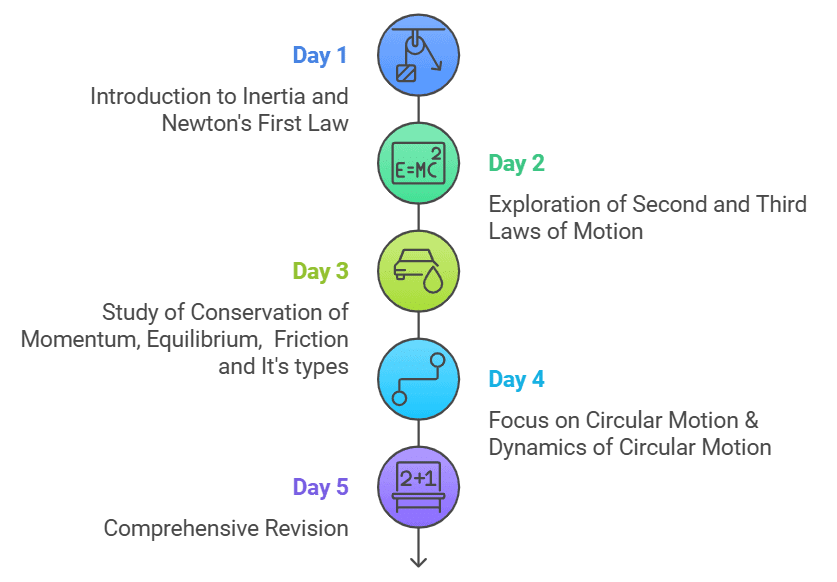5 Days Study Plan: Laws of Motion | Physics Class 11 - NEET PDF Download
Let's explore the Class 11 Physics chapter called "Laws of Motion" and how it's important for the NEET exam. By studying the past years NEET questions (from 2016 to 2025), we can see that this chapter is really important in the exam. If you want to score well in NEET, you need to understand the ideas in this chapter.
Topics Covered in the Chapter
- Law of Inertia & First Law of Motion
- Second Law of Motion
- Third Law of Motion
- Conservation of Momentum & Equilibrium of a Particle
- Friction & Its Types
- Circular Motion
- Dynamics of Circular Motion

Day 1: Law of Inertia & First Law of Motion
What to Cover Today:
- Begin with a thorough reading of the NCERT Textbook for this chapter.
- Focus on the concepts of inertia, force, and the first law of motion.
- Attempt questions from the NCERT textbook to test your understanding.
- Check out the mind map to get a visual overview.
Study Tips:
- Create flashcards with key definitions and concepts to aid your memory.
- Practice questions from the previous year questions document.
- Watch the video on Newton's Laws of Motion for a visual explanation.
Day 2: Second Law of Motion & Third Law of Motion
What to Cover Today:
- Dive into the second law of motion, emphasizing force, mass, and acceleration.
- Understand the third law of motion and how action and reaction forces work.
- Solve problems based on these laws from the NCERT textbook.
Study Tips:
- Use the PPT on Laws of Motion for visual clarity.
- Practice short and long answer questions from the short & long answer question document.
- Refer to the quick revision notes to reinforce your understanding.
Day 3: Conservation of Momentum, Equilibrium of a Particle, Friction, & Its Types
What to Cover Today:
- Study conservation of momentum and equilibrium of a particle.
- Learn about different types of friction, such as static and kinetic friction, and Friction & Its Types.
- Solve relevant problems from the NCERT textbook.
Study Tips:
- Create a mind map summarizing the key points from these topics.
- Take help from the NCERT Solutions for additional practice.
- Utilize the test on Newton's First Law of Motion to assess your knowledge.
Day 4: Circular Motion & Dynamics of Circular Motion
What to Cover Today:
- Focus on circular motion, including concepts like centripetal acceleration and centripetal force.
- Study the dynamics of circular motion, understanding the forces involved.
- Solve problems related to these topics from the NCERT textbook.
Study Tips:
- Create a summary of important formulas and concepts for circular motion.
- Attempt questions from DPPs available on EduRev for additional practice.
Day 5: Revision
On this day, revise all the topics you have covered throughout the week. Use the quick revision notes as a quick reference. Focus on key concepts, formulas, and problem-solving techniques.
Remember to refer to EduRev for NCERT-based notes, solutions to NCERT questions, practice questions, and additional resources for a deeper understanding of the chapter. Keep practicing questions from the previous year questions document to test your knowledge and improve your problem-solving skills.
By following this study plan and utilizing EduRev resources, you'll be well-prepared to excel in the "Laws of Motion" chapter and perform confidently in the NEET exam.
 Study Plan for Laws of Motion
Study Plan for Laws of Motion
Here are all the important links and topic links for the "Laws of Motion" chapter:
Important Links:
- NEET Exam
- NEET Previous Year Questions (2016-2025)
- Mindmap for Laws of Motion
- PPT on Laws of Motion
- Short & Long Answer Question Document
- NCERT Solutions for Laws of Motion
- NCERT Textbook for Laws of Motion
- Quick Revision Notes for Laws of Motion
- Video on Newton's Laws of Motion
- Test: Newton’s First Law of Motion
- Physics Class 11 - Laws of Motion Chapter
Topic Links within the Study Plan:
- Law of Inertia & First Law of Motion
- Second Law of Motion
- Third Law of Motion
- Conservation of Momentum & Equilibrium of a Particle
- Friction & Its Types
- Circular Motion
- Dynamics of Circular Motion
You can use these links to access additional resources and study materials related to each topic within the chapter.
Good luck with your studies!
|
119 videos|494 docs|98 tests
|
FAQs on 5 Days Study Plan: Laws of Motion - Physics Class 11 - NEET
| 1. What is the law of inertia? |  |
| 2. What is the first law of motion? |  |
| 3. What is the second law of motion? |  |
| 4. What is the third law of motion? |  |
| 5. What is conservation of momentum? |  |






















